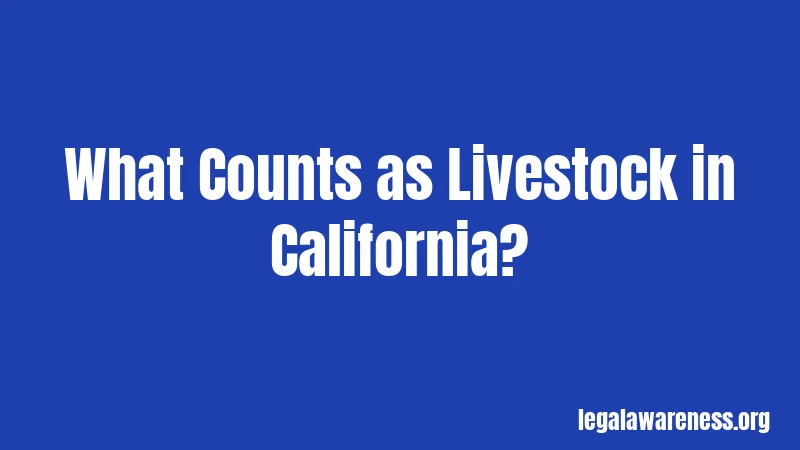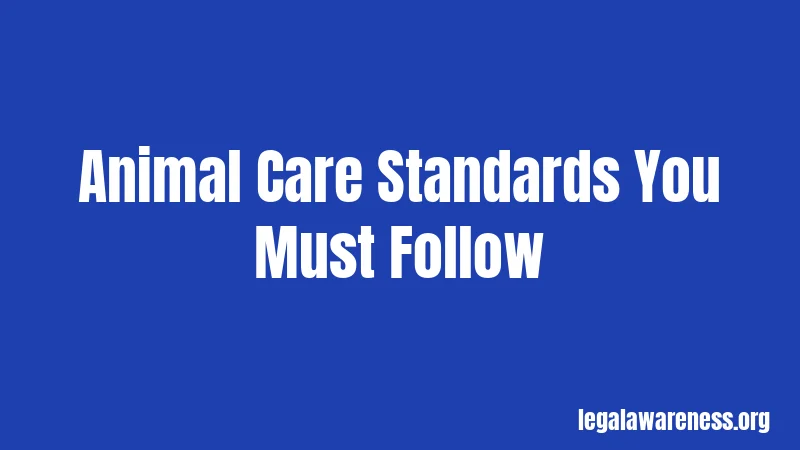California Livestock Laws in 2026: What Every Animal Owner Must Know
Here’s the thing about livestock laws in California. They’re stricter than most people realize. Whether you’re raising chickens in your backyard or managing cattle on a ranch, California has specific rules you need to follow. Breaking them? That can cost you big time. Let’s dig into what you actually need to know.
Most folks don’t realize how detailed these regulations get. California takes animal care seriously. The state has updated several laws recently, and some penalties are pretty serious. We’re going to break this all down in a way that actually makes sense.
What Counts as Livestock in California?

Livestock is basically any farm animal raised for food, fiber, or other products. This includes cattle, horses, sheep, goats, pigs, chickens, turkeys, bees, and rabbits. But here’s where it gets interesting. California’s definition sometimes includes animals you wouldn’t expect.
Pretty straightforward so far, right? But California makes distinctions based on how many animals you have. That matters because the rules change depending on your situation. Think of it like layers. More animals? More regulations.
Basic Livestock Ownership Requirements
Identification and Recordkeeping
If you own livestock in California, you need to keep records. This is basic stuff, but many people skip it. You should document what animals you own, when you got them, and any health treatments.
For some animals, identification is required by law. Cattle, horses, goats, and sheep need official ID tags or brands in many cases. It’s not optional. The state uses this system to track animals and prevent disease spread.
Wait, here’s something important. If you move livestock across county lines, you’ll need a health certificate from a veterinarian. You can’t just load up animals and drive them wherever. California monitors animal movement carefully.
Not sure what qualifies for your situation? The California Department of Food and Agriculture can answer specific questions. They handle livestock regulations statewide.
Property and Zoning Rules
Okay, pause. Read this carefully. Where you keep your livestock depends on local zoning laws. California allows livestock in rural and unincorporated areas. But in cities and suburbs? It depends entirely on your city’s rules.
Many cities allow small numbers of chickens in residential areas. Some allow a few goats. But larger animals like cattle or horses? Usually not in urban zones. You need to check with your local city planning department before getting any animals.
This part confuses a lot of people, honestly. They get animals first, then find out it’s illegal. The smart move is calling your city or county planning office before you invest money.
Animal Care Standards You Must Follow

California has tough animal care laws. The state requires that all livestock receives adequate food, water, shelter, and veterinary care. These aren’t suggestions. They’re legal requirements.
Animals must have access to clean water daily. They need shelter appropriate to the weather and season. Feed must be nutritious and available regularly. Failure to meet these standards is animal cruelty, and it’s illegal.
Here’s where it gets serious. If you’re neglecting livestock, someone can report you. Animal control or the sheriff’s office will investigate. You could face fines, loss of your animals, or criminal charges. Some cases even result in jail time.
This is probably the most important rule most people miss. Animal welfare violations carry real consequences in California. The state takes this seriously, and you should too.
Veterinary Care Requirements
Your livestock needs veterinary attention. Vaccinations, health checks, and treatment for illness aren’t optional. They’re legal obligations.
For certain animals, specific vaccinations are required. Horses need rabies protection in many areas. Cattle require various vaccines depending on their use. Your veterinarian can tell you exactly what’s needed for your animals.
Animals showing signs of illness must get treatment. You can’t just hope they get better. Ignoring health problems is illegal and cruel. If you can’t afford veterinary care, you shouldn’t own livestock.
Livestock-Specific Laws
Cattle and Large Livestock
California requires cattle to be branded or ear-tagged. This helps track animals for disease control and theft prevention. You need to register your brand with the state. The process is relatively simple but absolutely necessary.
Moving cattle across county lines requires a health certificate from a licensed veterinarian. The certificate must document that the animals are healthy. It’s your responsibility to get this before transport.
Grazing permits are required if you use public land. California has strict rules about how livestock can use state and federal land. Overgrazing is prohibited, and you can face fines for violations.
Poultry and Small Birds
Chickens in residential areas are allowed in many California cities, but rules vary wildly. Some cities allow up to three chickens. Others allow more. Some ban them entirely. You must check local ordinances before getting chickens.
If you keep more than a few birds, you might need permits. Large-scale poultry operations require department of agriculture permits. This includes backyard flocks if they’re too large for residential zoning.
Chickens need proper housing away from neighbors. Roosters are particularly regulated because of noise. Many cities ban roosters entirely or allow only one. Check before getting one.
Horses and Equines
Horses need specific care standards. They require daily exercise, adequate feed, clean water, and shelter. Horses cannot be kept permanently in stalls or small spaces. California has minimum space requirements.
Horses need veterinary care, including vaccinations and dental work. You’re responsible for maintaining their health. Neglect is illegal and can result in animal seizure.
If you transport horses across state lines, you need health certificates and proper documentation. California border crossings require inspection for certain livestock movements.
Recent Law Changes (2024-2026)

California updated several livestock laws recently. Some changes affect how you keep animals. Others impact what you can sell.
Animal care standards were enhanced in 2024. The state added more specific requirements for shelter and exercise space. Confinement practices that were previously allowed are now illegal for some animals.
Antibiotic use in livestock became more restricted. You can’t use antibiotics without veterinary oversight. This protects animal and human health. It also means veterinary costs might increase.
Manure management rules got stricter too. How you handle animal waste affects water quality. Improper management can result in fines. You need to store and handle manure properly.
Honestly, these changes make California one of the strictest states for livestock. But they also improve animal welfare standards. Owners who treat animals well shouldn’t have problems.
Penalties and Consequences
Breaking livestock laws carries real penalties. Fines can range from a few hundred dollars to thousands. Serious violations can result in criminal charges.
Minor violations—like improper record-keeping—usually result in fines. First-time offenders might pay $100 to $500. But repeat violations bring higher fines. Second and third offenses get serious quickly.
Animal cruelty charges are much worse. These can result in fines up to $20,000 and jail time up to one year. Serious cruelty cases can bring felony charges with years of imprisonment. This isn’t theoretical. California prosecutes animal cruelty aggressively.
Property seizure is another consequence. If animals are neglected, authorities can confiscate them. You lose your animals. You might still be responsible for their care costs. It’s a double hit.
Think of it like a traffic violation, but much more serious. Minor infractions are small fines. Major violations affect your freedom and finances significantly.
Livestock on Small Properties
Let’s talk about the situation most people face. You’ve got a small property. Maybe a few acres. You want to keep some livestock. What can you actually do?
Chickens are usually your safest bet for small properties. Three to six chickens work well on a small lot. You need a secure coop. Predators are a real problem. A good coop costs money, but it’s necessary.
Goats work on small properties if you have about a quarter-acre per animal. They need shelter, pasture, and good fencing. Goats are surprisingly escape-prone. Your fencing needs to be excellent.
Rabbits require minimal space and can be raised in hutches. They reproduce quickly though. You need a plan for increasing numbers. Many people raise rabbits for meat or fiber.
Sheep need about an acre per animal. They need pasture, shelter, and protection from predators. A border collie or similar dog helps manage them. Sheep are harder to contain than goats.
Horses are basically impossible on small properties. They need at least one acre per horse. Two acres is better. If you have less land, horses aren’t realistic. They require professional-level care.
Transporting Livestock
Moving livestock across California requires following specific rules. You can’t just load animals in a trailer and drive across the state.
Health certificates are required for most livestock movements. A veterinarian must examine animals and certify they’re healthy. The certificate must be current, usually within the last 30 days.
You need proper trailers with ventilation. Animals can’t be overcrowded. They need access to water during long trips. Failure to follow transport rules can result in animal cruelty charges.
If you’re crossing county or state lines, research regulations first. Different areas have different requirements. One mistake can get animals confiscated at the border.
Disease and Quarantine Rules
California takes livestock diseases seriously. The state operates a disease control program. Your animals might be subject to testing or quarantine.
If animals show signs of contagious disease, you must report it. You can’t hide sick animals. Spreading disease is illegal and dangerous. You’re responsible for preventing transmission to other herds.
Some diseases require mandatory treatment. Others require quarantine. You must follow state instructions exactly. Failure to comply results in fines and possible legal action.
Vaccines are required for some diseases. Rabies vaccination is common. Other vaccines depend on your area and animal type. Your veterinarian can advise on requirements.
Livestock and Water Rights
Here’s where it gets interesting. Water rights in California are complex. Your livestock needs water, but you can’t just take it from any source.
You need water rights to use surface water. If you have a stream or pond, you might not be able to use it for livestock. Water rights are regulated separately from land rights. You need permits for most water uses.
Groundwater is different. You usually can pump groundwater for livestock, but excessive use might require permits. The rules are complicated and vary by region.
Polluting water sources is illegal. Livestock waste contaminating water creates legal liability. You’re responsible for proper manure management near water sources. This protects both wildlife and human water supplies.
Selling Livestock and Products
Want to sell eggs, milk, or meat from your livestock? California has rules for that.
Small-scale sales might be allowed without permits. Selling a few dozen eggs from your chickens might be legal. But selling from a large-scale operation requires licensing.
Dairy products require special licensing and facilities. You can’t just sell milk from your goats without proper permits and inspections. Meat sales are similarly regulated. You usually need a licensed slaughterhouse.
Processed products have different rules. Cheese, yogurt, and preserved foods have specific regulations. You might be able to produce some items legally, but others require commercial facilities.
Check with your local health department before selling anything. Regulations vary by county. What’s legal in one area might be illegal in another.
Special Circumstances and Exceptions
Agricultural Exemptions
Some properties have agricultural exemptions. These allow livestock in areas that otherwise prohibit them. You need to qualify for these exemptions.
To qualify, your property usually must be at least one or two acres. You must be using the land for agricultural purposes. Having a few animals doesn’t automatically qualify you.
Small farm operations sometimes get exemptions. But exemptions vary by city and county. You need to apply for them officially. Don’t assume you have an exemption just because you have animals.
Sanctuary and Rescue Operations
Running an animal sanctuary or rescue has special legal status. You need proper permits and licenses. These operations are regulated differently than regular farms.
Sanctuaries must meet specific care standards. Inspections are common. You need veterinary documentation and detailed records. The cost of running a legitimate sanctuary is significant.
Don’t confuse a personal collection of animals with a sanctuary. Legitimate sanctuaries have non-profit status or agricultural licensing. You can’t just keep unlimited animals and call it a sanctuary.
Native Animals and Wildlife
You can’t keep native wildlife as livestock. California has strict wildlife laws. These animals require special permits and are usually not allowed in private ownership.
Some people raise domesticated animals that resemble wild animals. Llamas, alpacas, and emus are legal. True wildlife like deer or elk are not. Know the difference.
If wildlife damages your livestock, you can report it to wildlife agencies. They might help manage the situation. You generally can’t kill protected wildlife, even if it’s eating your animals.
How to Stay Compliant
Before You Get Animals
Talk to your city planning department first. Get zoning rules in writing. Ask about permits or licenses you’ll need. This one step prevents most problems.
Research local ordinances thoroughly. What’s allowed in one city is banned in another. Get specific information about the number of animals allowed.
Check if you need permits. Some areas require permits for livestock. Others don’t. Get confirmation in writing from your city or county.
Connect with a local veterinarian before getting animals. Discuss care requirements and costs. Find out what health certifications your animals will need.
Ongoing Compliance
Keep detailed records of everything. Document animal purchases, health care, vaccinations, and treatments. These records protect you legally.
Schedule regular veterinary checkups. Preventive care is cheaper than emergency care. Plus, it’s required by law. Don’t skip vet appointments to save money.
Stay informed about regulation changes. California updates livestock laws regularly. Follow news from the California Department of Food and Agriculture. Subscribe to agricultural newsletters if possible.
Follow local ordinances exactly. If your city allows three chickens, keep three. Don’t assume enforcement is relaxed.
When You Need Help
Contact your local agricultural commissioner if you have questions. They can explain specific regulations for your area. Their phone numbers are public.
Join local farming groups or agricultural associations. Other farmers deal with the same rules. They can share practical advice and experiences.
Consider hiring an agricultural attorney for complex situations. If you’re starting a significant operation, legal advice is worth the cost. It prevents expensive mistakes.
Your veterinarian is a great resource. They understand California livestock laws. They can advise on legal compliance for your specific situation.
Frequently Asked Questions
Can I keep backyard chickens in California?
It depends on your city. Many California cities allow three to six chickens in residential areas, but some ban them entirely. Check your local city ordinances before getting any birds. Some cities require permits even for small flocks.
What happens if I don’t have a health certificate when moving livestock?
You can be fined and the animals might be confiscated. Health certificates are legally required for livestock movement across county lines. Veterinarians can issue them quickly, so plan ahead before moving animals.
Do I need permits for a small home farm?
Probably. Even small operations often need permits or licenses, depending on your city and the type of animals. Contact your local planning department to find out exactly what you need before starting any livestock operation.
What’s the punishment for animal cruelty in California?
First-time animal cruelty can result in fines up to $20,000 and jail time up to one year. Second violations carry harsher penalties. Serious cases can result in felony charges with years of imprisonment and thousands in fines.
Can I sell eggs or meat from my livestock?
Small-scale sales of eggs from backyard chickens might be allowed without permits in some areas. But selling meat, dairy products, or large quantities usually requires licensing and inspections. Check with your local health department about specific rules.
Final Thoughts
California livestock laws are detailed and serious. They exist to protect animal welfare and public health. Whether you’re raising a few chickens or managing cattle, compliance is non-negotiable.
The good news? Most of these rules aren’t complicated. They make sense. Treating animals well, keeping records, getting veterinary care, and following local ordinances will keep you legal.
Start by contacting your local city and county offices. Get written confirmation of what’s allowed. Talk to a veterinarian. Connect with other livestock owners in your area.
Stay informed, stay compliant, and your livestock operation will be successful. Break the rules, and you’re risking real legal consequences. When in doubt, ask an official or consult an agricultural attorney. It’s worth it.
References
- California Department of Food and Agriculture – Livestock
- California Code, Title 3 – Agriculture (Animal Care Standards)
- Penal Code Section 399c – Animal Cruelty Penalties
- California Code Section 14000 et seq. – Veterinary Medicine Practice Act
- City and County Zoning Information – Contact Your Local Planning Department
